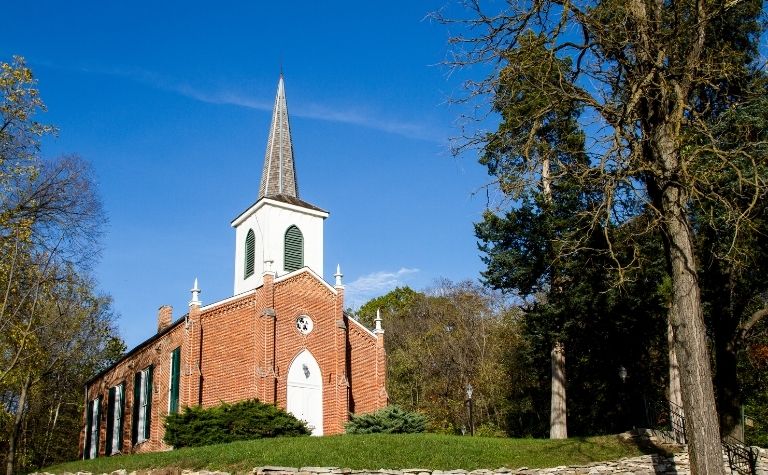The teachings of French pastor and theologian John Calvin (1509-1564) have been a significant part of the Protestant branch of the Christian faith for over 500 years. At the beginning of the 21st century, Calvinism shows no signs of waning.
Presbyterian denominations are Calvinist, like the Presbyterian Church in America. Reformed denominations are also Calvinistic, like the United Reformed Churches of North America. Some Baptist denominations are Calvinist, like the Association of Reformed Baptist Churches of America.
What is Calvinism like in Presbyterian, Reformed, and Baptist denominations today? Can non-denominational churches be Calvinist? What does Calvinism teach exactly? Keep reading to learn more.

Calvinism in Presbyterian, Reformed, and Reformed Baptist Churches
Some denominations are named after their founder, like “Lutheranism,” which is named after the German Reformer Martin Luther (1483-1546). While no denomination is called “Calvinism,” some denominations are Calvinistic.
- Presbyterian: the name “Presbyterian” refers to a form of church government in which elders represent the congregation.
- Reformed: the word “Reformed” refers to a theological system that emerged (or was re-discovered) at the time of the Protestant Reformation.
“Calvinism” and “Reformed theology” are terms many Christians use interchangeably. However, “Calvinism” refers to the teachings of John Calvin, and “Reformed theology” in some contexts may refer to other Protestant teachings because, in a general sense, the entire tradition reformed certain Roman Catholic beliefs and practices. (Also see What Christian Denominations Believe In Predestination?)
Presbyterian Denominations are Historically Calvinist
Historically, Presbyterian churches not only operated with a Presbyterian form of church government but championed Calvinist teaching as well. Other Reformers influenced the denomination, too, like John Knox of Scotland (1514-1572).
Are Presbyterian denominations still Calvinist today? Some Presbyterian denominations emphasize Calvinist doctrine today, like the Presbyterian Church in America (PCA).
Others, like the Presbyterian Church USA (PCUSA), are charged with suppressing the historical teachings of the tradition in favor of embracing modern social values.
Reformed Denominations are Historically Calvinist
The word “Reformed” can refer to Protestant people, theology, or churches. In some contexts, “Reformed” can also refer to liberal and progressive movements inside certain traditions that desire to reform conservative teaching. (Also see What Denominations Are Arminian?)
“Reformed” is also the name of a denomination in the Protestant tradition that adheres to Calvinist theology. Denominations in this tradition include,
- Christian Reformed Church in North America
- Evangelical Association of Reformed and Congregational Churches
- Netherlands Reformed Congregations in North America
- Protestant Reformed Churches in America
- Reformed Church in America
- Reformed Church in the United States

What are Reformed Baptist Denominations and Churches?
The Baptist tradition emphasizes baptizing professing Christians (i.e., not infants), congregational church government, and the separation of church and state. The Baptist tradition includes Calvinists and Arminians.
- There are Arminian Baptist denominations, like the National Association of Free Will Baptists.
- There are also Reformed or Calvinist Baptist denominations, like the Association of Reformed Baptist Churches of America.
Baptists, who are also Calvinists, have grown in number and influence, especially in America. Well-known and well-liked pastors, speakers, and writers like Albert Mohler and John Piper have helped people understand and embrace Calvinist teaching. (Also see Do All Denominations Go to Heaven?)
Why aren’t there more Reformed Baptist denominations and churches? One reason Reformed Baptist denominations and churches aren’t larger is that people with Reformed or Calvinistic theological convictions are often comfortable in whatever Baptist church they attend.
A person can be Calvinist and attend a Southern Baptist Church (SBC) or a Conservative Baptist Church (CBA), for example, which eliminates the need to move elsewhere.
“I have my own private opinion that there is no such thing as preaching Christ and Him crucified, unless we preach what nowadays is called Calvinism. It is a nickname to call it Calvinism; Calvinism is the gospel, and nothing else.” (Baptist pastor C.H. Spurgeon, 1834-1892)
Non-Denominational Calvinist Churches
Non-denominational churches are increasing in number. Most of them are Protestant, evangelical, and conservative theologically. Some non-denominational churches are Calvinist, and others are Arminian. (Also see How to Choose a Church Denomination)
What does non-denominational mean? “Non-denominational” means the church doesn’t associate with a denomination but is independent and conducts its own operational, staffing, and financial affairs.
Non-denominational churches often reflect the theological convictions of their founding pastor, some of whom are Calvinists.
Non-denominational churches tend to operate with a congregational form of church government. Because non-denominational churches are independent, they have no regional presbyter or missionary. (Also see Do All Christian Denominations Baptize?)
Some non-denominational churches emphasize the teachings of Calvin. Some non-denominational pastors preach the five points of T.U.L.I.P. Others preach T.U.L.I.P. and other aspects of Reformed Christianity, like Covenant Theology.
Other non-denominational churches stress that people are free to be Calvinist, Arminian, or something else and still be a member in good standing in the church. (Also see The Largest Denominations in America: The Top 100)

What Does Calvinism Teach?
Calvinism is often summarized with the acronym T.U.L.I.P., though that five-point explanation didn’t originate with him but with his followers. T.U.L.I.P. stands for,
- Total Depravity
- Unconditional Election
- Limited Atonement
- Irresistible Grace
- Perseverance of the Saints
Reformed theology has other tenets, which Calvin influenced, along with other theologians like Augustine (354-430) and Ulrich Zwingli (1484-1531). These tenets include,
- An emphasis on three foundational covenants: redemption, works, and grace
- An emphasis on the continuity between the Old and New Testament
- An emphasis on the sovereignty and glory of God
Calvin wrote a book on systematic theology and Bible commentaries. Calvin worked on his systematic theology text, The Institutes of the Christian Religion, for most of his life.
It’s still widely read and used in churches and colleges, and universities. Calvin also wrote commentaries on most books of the Bible. He famously didn’t write one on Revelation.
“It is most misleading to call this soteriology ‘Calvinism’ at all, for it is not a peculiarity of John Calvin and the divines of Dort, but a part of the revealed truth of God and the catholic (universal) Christian faith.”
He continues, “‘Calvinism’ is one of the ‘odious names’ by which down the centuries prejudice has been raised against it. But the thing itself is just the biblical gospel.” (J.I. Packer, theologian, 1926-2020)
Please see the related articles below.
References:
[1] Source
[2] Source
[3[ Source
Related Articles
Catholic vs. Protestant vs. Orthodox: What's the Difference?
Roman Catholicism, Protestant Christianity, and the Eastern Orthodox Church are the three historical branches of the Christian religion. Each tradition traces its doctrines and practices to the New...
Christianity is an important part of the American story in its various denominational expressions. Some denominations came to America from Europe, while others started on American soil. The size of a...
